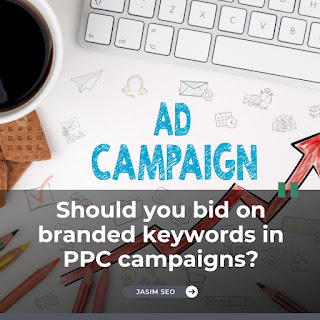In search campaigns, branded keywords are bidding keywords that are directly related to your business name or brand.
Here are some frequently asked questions about bidding on branded keywords. Why pay for clicks when our website is already the #1 organic search result for our name?
Okay. Buying branded pay-per-click ads can be a huge waste of money if you're the only ad and he's #1 in organic search results too. (This dilemma is discussed at the end of this article.) But all other scenarios are worth checking out.
Here are three reasons why you should bid on branded search terms in PPC.
- Show yourself like your competitors don't.
- Increase your visibility in search results.
- Controlling message delivery.
We'll talk about them first, then how to manage the wasted advertising dollars associated with bidding on branded keywords.
1. Appeal that competitors do not
yes. Competitors can bid on your company name and branded keywords to show their ads when someone searches for your company, products, and more.
And you can steal traffic and business. There are many reasons why people click on your competitors' ads.
Maybe they're multitasking and picking only the first result without looking closely. Maybe they don't know it's an ad and instead thinks it's an organic listing. Or a competitor's ad may point out your shortcomings and persuade thoughtful searchers to visit your site. We want to make sure your business is visible. Best case: A search for the brand term "Quickbooks" brings up a competitor's ad.
By the way, you can use Google Ads to find out who is bidding on terms for your brand. After creating your brand campaign, go to your Google Ads account > Auction Statistics. If you know who is bidding on your terms, you can plan your counterattack.
If you believe a competitor has infringed your trademark, you can file a complaint with Google Ads here. You can also report an ad if it violates Google Ads policies. Alternatively, you can reach out to your competitors and have a conversation.
2. Increase Visibility in Search Results
Organic "blue links" represent one area of the search results page that you want to own for your branded terms. The more you show up in search results, the better. By running SEO rankings and PPC campaigns at the same time, you can increase brand awareness and increase conversions.
3. Control messaging
When someone searches for your brand name and your website appears in organic search results, the snippet they see is usually pulled from your homepage metadata. increase. You can control what you put in your metadata, but you can't always control how Google displays your metadata.
Ads not only give you more control over your message, but they also allow you to use overly compelling ad copy in your home page meta tags.
Don't waste your money bidding on branded keywords. But when is it a bad idea?
You shouldn't pay for PPC if you're the only ad on the search results page and the #1 organic search result.
This scenario could result in wasted advertising dollars of thousands or even millions per year, depending on the volume of traffic. (Side note: The whole food example above seems to fall into this category now.)
So what do we do? Simply search by brand name here.
If only one ad was followed by the best organic search results, we should reduce the cost of users wasting a lot of money by clicking on ads. Ads are constantly changing and may require careful monitoring.
There are tools that can help with this. I actually use one of these as an extension of his PPC service.
The tools we use determine if you have only PPC ads and if you are also the first organic result. Then don't show ads on the results page for that search query. Tell Google Ads to do so. That way users won't see it and you won't waste ad dollars.
To manage wasted advertising dollars associated with bidding on branded keywords, you should:
Ultimately, we'd like to have more control over how the brand appears on the search results page. Bidding on branded keywords in search campaigns is easy as long as it's not a waste of money.

Comments
Post a Comment